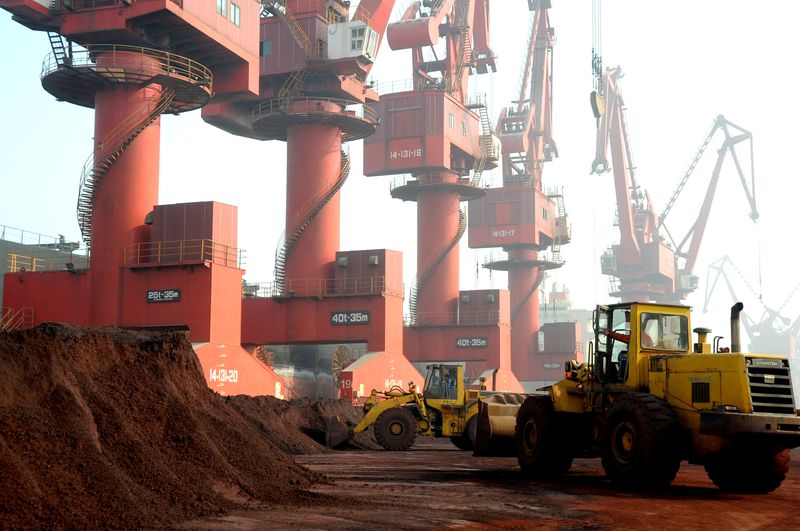By Ernest Scheyder
(Reuters) - A bipartisan piece of legislation introduced in the U.S. Senate on Friday would force defense contractors to stop buying rare earths from China by 2026 and use the Pentagon to create a permanent stockpile of the strategic minerals.
The bill, sponsored by Senators Tom Cotton, an Arkansas Republican, and Mark Kelly, an Arizona Democrat, is the latest in a string of U.S. legislation seeking to thwart China's near control over the sector.
It essentially uses the Pentagon's purchase of billions of dollars worth of fighter jets, missiles and other weapons as leverage to require contractors to stop relying on China and, by extension, support the revival of U.S. rare earths production.
Rare earths are a group of 17 metals that, after processing, are used to make magnets found in electric vehicles, weaponry and electronics. While the United States created the industry in World War Two and U.S. military scientists developed the most widely-used type of rare earth magnet, China has slowly grown to control the entire sector the past 30 years.
The United States has only one rare earths mine and has no capability to process rare earth minerals.
"Ending American dependence on China for rare earths extraction and processing is critical to building up the U.S. defense and technology sectors," Cotton told Reuters.
The senator, who sits on the Senate's Armed Forces and Intelligence committees, described China's evolution into the global rare earths leader as "simply a policy choice that the United States made," adding that he hoped fresh policies would loosen Beijing's grip.
Known as the Restoring Essential Energy and Security Holdings Onshore for Rare Earths Act of 2022, the bill would codify and make permanent the Pentagon's ongoing stockpiling of the materials. China temporarily blocked rare earth exports to Japan in 2010 and has issued vague threats it could do the same to the United States.
To build that reserve, though, the Pentagon buys supply in part from China, a paradox that Senate staffers hope will abate in time.
The rare earths production process can be highly pollutive, part of the reason why it grew unpopular in the United States. Ongoing research is attempting to make the process cleaner.
Cotton said he has talked to various U.S. executive agencies about the bill, but declined to say if he had talked with President Joe Biden or the White House.
"This is an area in which Congress will lead, because many members have been concerned about this very topic, regardless of party," he said.
ENCOURAGE DOMESTIC OUTPUT
Most members of the nascent U.S. rare earths sector praised the bill, though some worried defense contractors could continue to ask for waivers to buy Chinese rare earths even after 2026.
The Aerospace Industries Association, a trade group for Northrop Grumman Corp (NYSE:NOC), Lockheed Martin Corp (NYSE:LMT) and other U.S. aerospace and defense companies, declined to comment on the bill.
"Well placed policies such as this one get us closer to the target of onshoring this critical supply chain," said Marty Weems, North American president of Australia-based American Rare Earths Ltd, which is developing three U.S. rare earth projects.
MP Materials Corp , which operates the only U.S. rare earths mine and relies on Chinese processors, said it appreciates "ongoing efforts by the Department of Defense and broader U.S. government to secure the domestic rare earth supply chain and promote free and fair competition."
The bill, which the sponsors expect could be folded into Pentagon funding legislation later this year, offers no direct support for U.S. rare earths miners or processors.
Instead, it requires Pentagon contractors to stop using Chinese rare earths within four years, allowing waivers only in rare situations. Defense contractors would be required to immediately say where they source the minerals.
Those requirements "should encourage more domestic (rare earths) development in our country," Cotton said.
The Pentagon has in the past two years given grants to companies trying to resume U.S. rare earth processing and magnet production, including MP Materials, Australia's Lynas Rare Earth Ltd, TDA Magnetics Inc and Urban Mining Co.
Kelly, a former astronaut and a member of the Senate's Armed Services and Energy committees, said the bill should "strengthen America's position as a global leader in technology by reducing our country's reliance on adversaries like China for rare earth elements."
The bill only applies to weapons, not other equipment the U.S. military purchases.
Additionally, the U.S. trade representative would be required to investigate whether China is distorting the rare earths market and recommend whether trade sanctions are needed.
When asked if such a step could be seen as antagonistic by Beijing, Cotton said: "I don't think the answer to Chinese aggression or Chinese threats is to continue to subject ourselves to Chinese threats."
